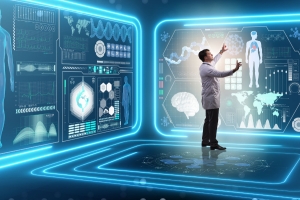Marketing MedicsPro
Climate change is no longer just an environmental issue — it has become a critical public health concern affecting populations worldwide. For healthcare workers, understanding the links between climate change and health is essential to prepare for emerging challenges and protect patient wellbeing. MedicsPro is dedicated to supporting healthcare professionals with the knowledge and resources they need to respond effectively to these evolving threats.
How Climate Change Affects Public Health
Climate change impacts public health through a variety of direct and indirect pathways, including:
• Increased heat-related illnesses: Rising temperatures contribute to heat exhaustion, heatstroke, and exacerbate cardiovascular and respiratory conditions.
• Spread of infectious diseases: Changes in climate affect the distribution of vectors like mosquitoes, leading to increased cases of diseases such as malaria, dengue, and Lyme disease.
• Air quality deterioration: Pollution and wildfires worsen respiratory conditions such as asthma and chronic obstructive pulmonary disease (COPD).
• Food and water security risks: Extreme weather events disrupt food production and water supply, leading to malnutrition and waterborne diseases.
• Mental health impacts: Climate-related disasters and displacement can cause stress, anxiety, and other mental health issues.
What Healthcare Workers Need to Know
Healthcare workers are on the frontline of climate-related health impacts. Key areas to focus on include:
1. Recognising Climate-Related Health Conditions
Awareness of symptoms and conditions linked to climate change helps in early diagnosis and appropriate care. MedicsPro encourages continuous education to keep healthcare professionals informed of emerging trends.
2. Preparing for Increased Healthcare Demand
Extreme weather events and disease outbreaks may lead to surges in healthcare needs. MedicsPro supports healthcare providers by supplying skilled staff ready to respond in times of crisis and beyond.
3. Advocating for Sustainable Healthcare Practices
Reducing the carbon footprint of healthcare facilities is vital. Healthcare workers can champion sustainability initiatives such as waste reduction, energy efficiency, and green procurement.
4. Community Education and Engagement
Educating patients and communities about climate risks and preventative measures fosters resilience. MedicsPro promotes training for healthcare professionals in effective communication strategies.
The Role of MedicsPro in Climate-Responsive Healthcare
MedicsPro is committed to equipping healthcare organisations with the workforce and technology needed to meet the challenges posed by climate change. Through specialised recruitment, training, and resource provision, we help healthcare providers maintain high-quality care in an increasingly complex environment.
In today’s dynamic healthcare environment, teams often span multiple generations — from Baby Boomers and Generation X to Millennials and Generation Z. Managing these multigenerational teams effectively is essential for fostering collaboration, improving patient care, and enhancing workplace satisfaction. MedicsPro understands the unique challenges and opportunities this diversity presents and offers guidance for healthcare leaders and professionals.
Why Multigenerational Teams Matter in Healthcare
Healthcare settings thrive on teamwork, communication, and shared goals. Each generation brings distinct experiences, work styles, values, and expectations that influence how they approach their roles. Leveraging this diversity leads to more innovative solutions, better problem-solving, and a richer organisational culture.
Multigenerational teams bring together decades of clinical experience, technological savvy, and fresh perspectives — all vital ingredients for delivering exceptional patient-centred care.
Key Challenges in Managing Multigenerational Healthcare Teams
• Communication gaps: Preferences vary widely, from face-to-face conversations to emails or instant messaging apps.
• Varied attitudes towards technology: Younger staff often prefer digital tools, while older generations may lean on traditional methods.
• Conflicting work values: Differences in work-life balance priorities, feedback styles, and motivational drivers can create friction.
• Stereotypes and misunderstandings: Age-based assumptions may hinder collaboration and trust if left unaddressed.
Best Practices for Managing Multigenerational Teams in Healthcare
1. Promote Open Communication
Create an inclusive environment where every team member feels valued and heard. Open communication minimises misunderstandings and builds mutual respect.
2. Provide Flexible Training and Development
Offer tailored training that meets diverse learning styles and technology comfort levels. Continuous professional development bridges generational gaps and keeps skills up to date.
3. Encourage Mentorship and Knowledge Sharing
Mentorship is a two-way street. Experienced healthcare workers can share clinical wisdom, while younger colleagues introduce new technologies and fresh ideas, fostering professional growth and continuity of care.
4. Adapt Leadership Styles
Effective leaders recognise individual needs and adapt their approach with empathy and flexibility, harnessing each team member’s strengths to create a cohesive unit.
5. Foster Team-Building Activities
Regular team-building exercises build rapport and trust, enhancing morale and collaboration across generations.
The Benefits of a Multigenerational Nursing Workforce
• Diverse perspectives and experiences: From seasoned clinical expertise to cutting-edge tech skills, diverse teams spark innovation and comprehensive care.
• Better understanding of patients: Teams reflecting a range of ages can relate to and cater for patients from all generations.
• Improved mentoring and learning opportunities: Knowledge transfer ensures valuable expertise isn’t lost and empowers all team members.
• Increased job satisfaction: Feeling valued for unique skills boosts morale and staff retention.
• Patient-centred care: Diversity supports personalised, empathetic care that meets broad patient needs.
Common Ground: What Nurses of All Generations Agree On
• Burnout is real: The demanding nature of healthcare affects everyone; addressing burnout is critical to workforce sustainability.
• Work-life balance is essential: Nurses value balance to maintain long-term job satisfaction and wellbeing.
• Respect and recognition matter: Every generation appreciates acknowledgement of their hard work and dedication.
• Safe staffing ratios are a priority: Adequate staffing ensures patient safety and quality care — a unanimous concern.
• Teamwork is key: Collaboration across generations is vital for delivering the best outcomes.
How MedicsPro Supports Multigenerational Healthcare Teams
At MedicsPro, we understand that managing diverse healthcare teams requires specialised strategies and support. Our tailored staffing solutions consider generational dynamics, helping healthcare organisations build inclusive and effective teams.
We offer:
• Bespoke recruitment and flexible contracts to fit varied lifestyles
• Mentorship programmes to foster knowledge sharing
• Training resources catering to different skill levels and preferences
• Employee assistance programmes supporting wellbeing
• Comprehensive benefits and continuous professional development
Our goal is to help healthcare professionals from every generation thrive, delivering outstanding care and adapting to the ever-evolving healthcare landscape.
Embracing the Future of Healthcare Together
The multigenerational nursing workforce embodies the resilience, innovation, and collaboration that will define healthcare’s future. By embracing the unique strengths of all generations, healthcare organisations can enhance patient care, improve workplace culture, and successfully navigate industry challenges.
Whether you’re a Baby Boomer passing on decades of experience, a Millennial introducing new tech, or a Gen Z nurse bringing fresh enthusiasm, MedicsPro is here to support your journey.
Join us in shaping a diverse, dynamic, and patient-centred healthcare workforce. Contact MedicsPro today to explore flexible roles and development opportunities tailored to you.
Taking your healthcare career abroad can open up a world of opportunity—both professionally and personally. Whether you’re a nurse, radiographer, doctor, or therapist, working overseas offers the chance to broaden your clinical experience, earn competitive salaries, and immerse yourself in new cultures.
At MedicsPro, we know many professionals are curious about taking their skills global. In this blog, we explore the key benefits and considerations of working abroad, and how to begin your international journey.
Why Consider Working Abroad in Healthcare?
1. Global Demand for UK-Trained Professionals
UK-trained healthcare workers are highly regarded worldwide for their clinical training, adaptability, and professionalism. From Australia and New Zealand to the Middle East and Canada, there is consistent demand for nurses, doctors, radiographers, physiotherapists, and more.
2. Expand Your Clinical Skillset
Working in a new healthcare system exposes you to different treatment approaches, technologies, and patient demographics. These experiences enrich your practice and enhance your employability in the long term.
3. Lifestyle and Financial Perks
Many international roles offer tax-free salaries, relocation packages, accommodation support, or funded flights. For many, this leads to a higher standard of living and improved work-life balance.
Challenges You Should Be Prepared For
1. Professional Registration
Before you can practise, you’ll likely need to register with the local authority. This may include meeting clinical hour requirements, submitting references, and passing language tests or exams (e.g. AHPRA in Australia or NCNZ in New Zealand).
Tip from MedicsPro: Always start the registration process early—it can take several months depending on the country.
2. Cultural and Clinical Adaptation
Healthcare systems differ globally. Be ready to adjust to new documentation processes, patient expectations, and ways of working. Cultural awareness and adaptability are essential traits for success.
3. Visa and Immigration Requirements
Visa processes can be complex and time-consuming. Some employers will provide sponsorship, but it’s important to understand the visa type, processing time, and any associated costs in advance.
Getting Started: Step-by-Step
1. Research Your Destination Country
o Understand the healthcare system, cost of living, working hours, and clinical demand for your profession.
2. Review Registration Requirements
o Gather your qualifications, clinical evidence, and English language test results if required.
3. Update Your CV
o Tailor your CV for the local job market. MedicsPro can support you in optimising your profile for international roles.
4. Connect with a Specialist Agency
o Working with MedicsPro can help you navigate job opportunities, registration, compliance, and relocation smoothly.
Final Thoughts
Working abroad is more than just a career move—it’s a life experience. While it comes with its challenges, the professional growth, cultural exposure, and financial benefits make it a highly rewarding option.
If you're exploring healthcare opportunities abroad, our team at MedicsPro is here to help. From first enquiries to placement support, we’re by your side every step of the way.
The healthcare industry is undergoing a profound transformation, driven by the rapid evolution of technology. From telemedicine and AI-assisted diagnostics to digital health records and wearable devices, technology is reshaping how healthcare professionals provide patient care and how patients experience healthcare services. In this blog, we’ll explore the ways technology is revolutionising healthcare and how healthcare professionals can adapt to these changes to enhance their day-to-day work and improve patient outcomes.
The Growing Role of Technology in Healthcare
Healthcare has traditionally been a sector built on face-to-face interactions between patients and healthcare professionals. However, the advancement of technology is pushing the boundaries of traditional care. Here’s a closer look at some of the key technological innovations that are reshaping healthcare:
1. Telemedicine: Bringing Healthcare to Your Doorstep
Telemedicine is one of the most notable changes in the healthcare sector, especially post-pandemic. It allows patients to consult with healthcare professionals remotely, using video calls, phone calls, or online chat platforms. This technology is not only improving access to care but also helping to reduce waiting times, making healthcare more accessible, especially for those in remote areas or with mobility issues.
• For Healthcare Professionals: Telemedicine allows healthcare workers, including doctors, nurses, and specialists, to extend their reach and manage patients more efficiently. It’s especially helpful in therapies and nursing, where patients can receive ongoing care remotely, reducing the need for in-person visits.
• For Patients: Telemedicine provides patients with convenient access to healthcare services from the comfort of their own home, saving time and travel costs. This is particularly beneficial for radiography consultations, follow-up appointments, and mental health care.
2. AI-Assisted Diagnostics: The Future of Precision Medicine
Artificial Intelligence (AI) is transforming how healthcare professionals diagnose and treat patients. AI algorithms are being used to analyse medical images, review patient data, and assist in diagnosing conditions with a level of accuracy that rivals human experts.
• For Healthcare Professionals: AI-powered diagnostic tools are increasingly being used by doctors, radiographers, and other healthcare professionals to help interpret medical images, scan for anomalies, and make faster decisions. These tools support healthcare professionals in delivering more precise and timely care while also reducing the chances of human error.
• For Patients: AI-assisted diagnostics can lead to earlier detection of diseases, such as cancer, heart conditions, and neurological disorders. With AI’s ability to process vast amounts of data, patients can receive more accurate diagnoses, leading to more targeted treatments and better outcomes.
3. Digital Health Records: Streamlining Patient Information
One of the most fundamental changes in healthcare technology is the move towards digital health records. Gone are the days of paper-based patient charts and files. Electronic Health Records (EHR) systems store patient information digitally, allowing for easy access and sharing across healthcare providers.
• For Healthcare Professionals: EHRs streamline workflows for healthcare workers in theatres, nursing, doctors, and therapies, enabling them to access patient histories, treatment plans, and medical results instantly. This improves communication between teams, reduces administrative workload, and enhances the overall efficiency of care delivery.
• For Patients: Digital records ensure that patient information is accurate, up-to-date, and easily accessible by any healthcare provider within the network. This results in fewer mistakes and a more seamless experience when seeking care, whether in the NHS or private healthcare sectors.
4. Wearable Health Devices: Empowering Patients with Real-Time Data
Wearable devices, such as fitness trackers, heart rate monitors, and glucose monitors, are becoming commonplace for patients and healthcare professionals alike. These devices collect real-time data on a patient’s health, enabling individuals to track their wellness and share vital information with their healthcare providers.
• For Healthcare Professionals: Healthcare workers, particularly doctors and therapists, can use data from wearable devices to monitor chronic conditions like diabetes or cardiovascular disease. This constant stream of data enables healthcare professionals to provide more proactive care, intervene when necessary, and adjust treatment plans based on real-time information.
• For Patients: Wearables empower patients to take control of their health by tracking important metrics such as physical activity, sleep patterns, and vital signs. These devices help patients make informed decisions about their lifestyle choices, improve overall health, and reduce the likelihood of preventable conditions.
5. Robotic Surgery: Revolutionising the Operating Room
The introduction of robotic surgery is one of the most exciting technological advancements in healthcare. Robotic-assisted surgery allows surgeons to perform complex procedures with greater precision and minimal invasiveness, reducing recovery times and improving patient outcomes.
• For Healthcare Professionals: Surgeons in theatres can now use robotic systems to perform highly detailed procedures with enhanced accuracy. These technologies allow for smaller incisions, less pain, and quicker recovery for patients. For healthcare workers, the shift to robotic surgery also means new skills and training, enhancing their capabilities and offering exciting career opportunities in this evolving field.
• For Patients: Robotic surgery leads to reduced hospital stays, fewer complications, and quicker recovery. Patients can benefit from less invasive procedures that are just as effective, if not more so, than traditional methods.
How Healthcare Professionals Can Adapt to Technological Change
As technology continues to evolve, healthcare professionals must stay ahead of the curve to maintain their effectiveness and relevance. Here’s how you can adapt to the technological changes that are transforming the healthcare landscape:
1. Continuous Learning and Training
The key to staying competitive in healthcare is continuous professional development. Take advantage of training and certification programmes in areas such as telemedicine, AI, and digital health tools. This will ensure you are equipped with the skills necessary to utilise the latest technologies in patient care.
2. Embrace Technology as a Tool
Technology is not here to replace healthcare professionals—it’s here to enhance their work. Embrace new technologies as tools that can help you deliver better care, improve outcomes, and increase efficiency. By adopting a positive attitude towards tech, you’ll be better positioned to integrate it into your practice.
3. Stay Informed
Keep yourself updated on the latest advancements in healthcare technology. Follow reputable journals, attend conferences, and engage with online forums where you can learn from experts and colleagues in the field. Being informed will help you understand how these innovations are shaping the future of healthcare.
4. Collaborate with Tech Specialists
Healthcare professionals are not expected to be tech experts, but working alongside IT professionals and tech specialists will help you leverage the full potential of healthcare technologies. Whether you're working with EHR systems or AI-powered diagnostic tools, collaboration is key to ensuring smooth integration and effective use of these technologies.
The Future of Healthcare Technology
The potential for technology to revolutionise healthcare is vast. As AI, telemedicine, and wearable health devices continue to advance, the role of technology in patient care will only grow. This shift presents exciting opportunities for healthcare professionals to enhance their practice and improve patient outcomes.
At MedicsPro, we understand the significance of staying ahead in the ever-changing world of healthcare. By adapting to technological advancements, healthcare professionals can not only provide the best care possible but also ensure they remain at the forefront of the industry.
Embrace technology, expand your skill set, and stay connected to the innovations that are shaping the future of healthcare. The game is changing—be ready to play.
How to Transition from Permanent to Locum Work
The healthcare sector is undergoing a transformation, with more professionals choosing to transition from permanent roles to locum work. Whether you're working in the NHS or private sector, locum positions offer unique benefits, including flexibility, variety, and the potential for higher pay. However, making the switch can feel daunting if you’re not familiar with the ins and outs of locum work. In this blog, we’ll explore the key aspects of transitioning from permanent employment to locum work, including the benefits and challenges, how to find shifts, managing contracts, and dealing with pay discrepancies.
Understanding the Flexibility of Locum Work
One of the most appealing aspects of locum work is the flexibility it offers. As a locum healthcare professional, you have the freedom to choose when and where you work. Whether you’re a nurse, doctor, radiographer, or therapist, locum roles allow you to set your own schedule, taking on shifts that fit your lifestyle and career goals.
For many healthcare professionals, especially those balancing work with family commitments or personal pursuits, the ability to take time off between contracts or select part-time work can be a significant advantage. The flexibility also allows you to gain experience in various settings, including hospitals, private clinics, and community healthcare centres. This diverse exposure can enhance your skills and build a more varied career portfolio, something that permanent positions might not offer.
However, it’s important to recognise that locum work can also require more proactivity in managing your schedule. Unlike permanent roles, where shifts are typically planned months in advance, locum work may require constant communication with agencies or direct employers to secure upcoming opportunities.
How to Find Locum Shifts
Finding locum shifts involves a combination of networking, joining agencies, and actively seeking opportunities. Many healthcare professionals who transition to locum work find it beneficial to work with specialist recruitment agencies such as MedicsPro, which offers a broad range of locum positions in the NHS and private healthcare sectors.
Locum agencies can connect you with a variety of roles that match your skills, from radiography to nursing, therapies, and theatres. They often have access to both short-term and long-term contracts, allowing you to choose roles that fit your needs. Agencies like MedicsPro also assist with the paperwork, ensuring that you meet all legal and professional requirements.
In addition to agencies, you can also find locum shifts by networking with your professional peers, attending industry events, and staying connected with employers directly. Many healthcare facilities, especially private hospitals and clinics, will offer locum positions as needed, and if you've built a strong relationship with the hiring team, you may find these opportunities more accessible.
Managing Contracts as a Locum Professional
When you move from a permanent position to locum work, you’ll be managing your contracts differently. As a permanent employee, your terms of employment were set by your employer. With locum work, however, you’ll be operating on a contract-by-contract basis, with each new role potentially having different terms, conditions, and expectations.
Here are a few key things to keep in mind when managing your locum contracts:
Understand the Terms: Before accepting a locum role, make sure you clearly understand the terms of the contract. What is the pay rate? How many hours are required each week? Is accommodation or travel covered? Take the time to read the fine print to avoid surprises.
Negotiate When Possible: Unlike permanent positions, locum roles often come with more room for negotiation. If you feel a particular position demands extra hours or expertise, don’t hesitate to negotiate a higher pay rate or additional benefits. The flexibility of locum work allows you to have more control over your compensation.
Document Everything: As a locum, you may be working for multiple employers throughout the year. Keeping track of your contracts, working hours, and any variations in terms will help you stay organised and ensure you are paid correctly. It also provides clarity in case there are any disputes about pay or working conditions.
Managing Pay Discrepancies
One of the main concerns for healthcare professionals considering locum work is pay discrepancies. While locum roles can offer higher pay than permanent positions, there may be variations in the rates offered depending on the employer, location, and specialty.
Here’s how to manage pay discrepancies effectively:
Know the Market Rate: Before accepting locum roles, it’s essential to research the going rates for your profession in your region. Agencies like MedicsPro can provide information about typical pay scales for locum roles across various specialties, including nursing, radiography, theatres, and therapies. Having this knowledge will empower you to negotiate better pay and ensure you're not undervalued.
Track Your Hours: As a locum, your pay is often based on the hours you work, so it’s essential to keep accurate records of your shifts. Double-check your pay slips to ensure that all hours worked are accurately reflected, and report any discrepancies to the agency or employer promptly.
Understand Payment Terms: Locum pay can vary depending on the structure of the agreement. Some contracts pay weekly, others may pay monthly, and some may include performance bonuses or incentives for taking on certain shifts. Be sure to clarify when and how you will be paid, and don’t be afraid to ask questions if something isn’t clear.
Overcoming the Challenges of Locum Work
While locum work offers many benefits, it’s not without its challenges. Some healthcare professionals may initially find the uncertainty of job security and income a concern. As a locum, you’re not guaranteed a steady stream of shifts, and periods of downtime can occur, especially in quieter months or for more specialised roles.
To mitigate this, it’s important to work with a reliable recruitment agency, such as MedicsPro, that can connect you with consistent opportunities and offer career advice. It's also helpful to maintain a healthy work-life balance, particularly if you’re balancing multiple contracts or roles at once.
Why Choose Locum Work?
Locum work is an increasingly popular career option for healthcare professionals looking for more flexibility and variety in their careers. Whether you’re a nurse, doctor, therapist, or radiographer, locum roles allow you to experience different healthcare settings, gain specialised skills, and earn a competitive salary. Moreover, locum work provides an opportunity to take control of your career, choose your hours, and build a diverse portfolio of experience.
At MedicsPro, we specialise in providing healthcare professionals with tailored locum opportunities across various sectors, including the NHS and private healthcare. Whether you're considering locum work for the first time or looking for new opportunities, our team is here to guide you through the transition and connect you with roles that suit your expertise and goals.
Ready to make the transition to locum work? Contact MedicsPro today for expert advice and to explore available locum opportunities that align with your career goals.
In the fast-paced world of healthcare, your professional network can be one of your greatest assets. Whether you're just starting out in your career or are a seasoned expert, building a strong network of connections can open doors to new opportunities, provide valuable career advice, and offer emotional support during challenging times. Networking isn't just about exchanging business cards—it's about cultivating meaningful relationships with people who can help you grow professionally and personally.
In this blog, we’ll explore how healthcare professionals can effectively build a strong professional network, both online and offline. We’ll provide tips on finding mentors, joining professional organisations, and staying connected with peers to ensure continued career success.
Why Networking is Crucial in Healthcare
Healthcare is a vast and diverse field, covering roles in nursing, theatres, radiography, doctors, therapies, and more. Networking offers countless benefits, including:
• Career Advancement: Networking can help you discover new job opportunities, including locum or permanent roles, that may not be widely advertised.
• Mentorship: A strong professional network allows you to find experienced mentors who can provide guidance and advice as you progress in your career.
• Industry Insight: Networking helps you stay informed about the latest trends, research, and advancements in the healthcare sector, ensuring you remain at the forefront of your field.
• Emotional Support: Having a network of peers who understand the demands and challenges of healthcare can provide much-needed support during stressful times.
• Collaboration Opportunities: Networking fosters collaboration, enabling you to work with others who share your professional interests, ultimately enhancing your skills and expertise.
Online Networking: Maximising the Power of Social Media
In today’s digital age, online networking is an essential tool for expanding your professional connections. The following platforms and methods are especially beneficial for healthcare professionals looking to grow their network:
1. LinkedIn
LinkedIn is a powerful tool for professional networking, and it’s especially popular in the healthcare sector. A strong LinkedIn profile allows you to showcase your experience, skills, and career achievements, helping you connect with others in your field.
• Optimise Your Profile: Ensure your LinkedIn profile is complete and reflects your qualifications, expertise, and career goals. Use a professional photo, write a compelling summary, and list your key skills and experiences.
• Engage with Content: Sharing articles, writing posts, and engaging in discussions on healthcare-related topics can increase your visibility and attract connections from like-minded professionals.
• Join Healthcare Groups: LinkedIn offers groups where healthcare professionals discuss industry trends, share job postings, and offer advice. Joining these groups can help you stay updated and connect with potential mentors and collaborators.
2. Webinars and Online Conferences
Many healthcare organisations and associations host webinars and online conferences on the latest industry topics. These virtual events provide opportunities to connect with experts, ask questions, and engage with other attendees. By attending regularly, you can expand your network and stay informed on new trends in healthcare.
• Be Active in Discussions: Don’t just attend webinars—actively participate by asking questions and contributing to discussions. This will increase your visibility and encourage others to reach out to you.
• Follow Up: After attending an event, follow up with speakers or attendees you found interesting. Sending a personalised LinkedIn message or email to connect can lead to long-term professional relationships.
3. Online Forums and Communities
There are a number of online forums and communities where healthcare professionals can seek advice, share experiences, and connect with peers. For instance, sites like Reddit and Quora have dedicated healthcare sections where professionals share insights on various specialties.
• Engage Regularly: Regular participation in these forums allows you to build a reputation as a knowledgeable and supportive member of the community, encouraging others to connect with you.
• Share Your Expertise: Offering advice and answering questions can help you establish yourself as an expert in your field, attracting potential mentors and collaborators.
Offline Networking: Building Relationships in Person
While online networking is essential, offline networking is equally important for creating genuine, long-lasting professional relationships. Here’s how you can make the most of in-person networking opportunities:
1. Conferences and Workshops
Attending healthcare conferences and workshops provides an excellent opportunity to meet professionals within your specialty, exchange ideas, and learn about the latest developments in your field. Conferences are especially useful for nurses, doctors, radiographers, and those in therapies.
• Prepare in Advance: Research the event beforehand and identify key speakers or professionals you’d like to connect with. Prepare your elevator pitch—short, clear, and memorable—to introduce yourself to potential contacts.
• Attend Social Events: Many conferences offer informal networking sessions, such as dinners or social hours. These are great opportunities to network in a more relaxed setting.
• Follow Up: After the event, reach out to individuals you connected with to maintain the relationship. Mention something specific from your conversation to personalise your message.
2. Professional Organisations and Associations
Joining a professional organisation related to your field is one of the most effective ways to build a strong network. Whether you’re part of the Royal College of Nursing, British Medical Association (BMA), or a specialty association in radiography or therapies, these groups offer access to exclusive networking events, resources, and job opportunities.
• Get Involved: Attend meetings, participate in committees, and take advantage of any mentorship or networking programmes offered by the organisation.
• Volunteer for Leadership Roles: Volunteering for committees or leadership positions within your professional association can help you meet influential professionals and gain recognition within your industry.
3. Workplace Networking
Don’t underestimate the value of networking within your own workplace, whether in the NHS or private healthcare sector. Building relationships with colleagues across different departments can create opportunities for career advancement and collaboration.
• Collaborate Across Specialties: Try to engage with professionals from different areas of healthcare, such as doctors, nurses, and radiographers. Learning about their roles and sharing your expertise can lead to new opportunities.
• Mentorship Within Your Organisation: If your workplace offers mentorship programmes, sign up. If not, consider seeking out a senior professional who can guide you in your career journey.
Finding a Mentor: The Key to Career Growth
A mentor can provide invaluable guidance and advice, especially in a complex field like healthcare. Finding a mentor can significantly accelerate your career development and help you navigate challenges with confidence.
• Be Proactive: Don’t wait for a mentor to find you—reach out to experienced professionals whose careers you admire and ask if they would be willing to offer guidance.
• Make It a Mutually Beneficial Relationship: A strong mentorship is based on reciprocity. Be open to offering help in return, whether through sharing your own expertise or assisting with projects.
Maintaining Your Network: The Long-Term Game
Building a network is only part of the process. Maintaining those connections is crucial for long-term success.
• Regular Check-ins: Reach out periodically to catch up with your network, even if you don’t need anything. A simple email or LinkedIn message can keep relationships strong.
• Offer Help: Networking is about give and take. Be proactive in offering help, whether it’s sharing a job opportunity or connecting someone with a relevant contact.
• Attend Regular Events: Make it a habit to attend professional events, even if they’re virtual. Keeping active in your professional community will ensure your network remains strong.
Conclusion: Networking for Success in Healthcare
Building and nurturing a professional network is one of the most powerful strategies for career growth in healthcare. By leveraging both online and offline opportunities, joining professional organisations, and seeking out mentorship, you can expand your connections and open doors to exciting career opportunities.
At MedicsPro, we understand how important networking is in the healthcare sector. We encourage healthcare professionals to invest time in building their professional relationships, as the connections you make today can shape your career tomorrow.
Start networking today, and watch your healthcare career soar.
Healthcare Careers of the Future: What’s Next?
The healthcare sector is undergoing rapid transformation, driven by technological advancements, evolving patient needs, and new industry standards. As healthcare professionals, staying ahead of these changes is crucial for long-term career success. From telemedicine to AI-powered diagnostics, emerging roles are reshaping the landscape of healthcare careers. But what does the future hold for healthcare professionals, and how can you position yourself for success in these new fields?
In this blog, we’ll explore some of the key trends shaping the future of healthcare and discuss how you can prepare for the new career opportunities that will arise from these changes.
The Rise of Telemedicine: A New Era of Healthcare Delivery
Telemedicine is one of the most significant shifts in healthcare in recent years, and its growth shows no signs of slowing down. The COVID-19 pandemic accelerated the adoption of remote consultations, and as the world continues to embrace digital solutions, telemedicine has become a mainstay in healthcare delivery.
For healthcare professionals, telemedicine offers new career opportunities across various roles. From telehealth nurses and remote care coordinators to virtual health coaches and telemedicine providers, the demand for skilled workers in this field is growing. The beauty of telemedicine is its flexibility—it allows healthcare professionals to provide care remotely, helping patients who may not have access to in-person appointments or who prefer the convenience of digital consultations.
If you're a healthcare professional looking to future-proof your career, gaining experience in telemedicine is a smart move. For example, telemedicine nurses are in demand to help manage patient consultations via phone or video, while radiographers can provide remote interpretation of medical imaging. As telemedicine continues to expand, more specialties will likely see integration into the virtual care space, offering exciting prospects for those prepared for these changes.
Healthcare Data Science: The New Frontier
The integration of data science into healthcare has the potential to revolutionise patient care, medical research, and healthcare operations. With the growth of electronic health records (EHRs), wearables, and other health-monitoring technologies, healthcare professionals now have access to vast amounts of patient data that can be analysed for trends, insights, and predictive modelling.
Healthcare data scientists are now in high demand to help make sense of this complex data. They work to improve decision-making, optimise patient outcomes, and support evidence-based practice. Whether it's developing predictive models for disease progression, analysing large datasets for clinical trials, or optimising hospital operations, healthcare data scientists are essential to the future of healthcare delivery.
For those in fields like nursing, radiography, and therapy, incorporating data science skills can position you at the forefront of this emerging trend. With the rise of AI tools, healthcare professionals will increasingly rely on data to make more informed clinical decisions. As a result, familiarity with data analytics platforms, machine learning, and AI algorithms will become valuable assets in your career toolkit.
Artificial Intelligence and Automation in Healthcare
Artificial intelligence (AI) is another major trend transforming healthcare. AI technologies are already being used for a range of applications, from diagnostic imaging and robotic surgery to personalised medicine and patient care robots. In particular, AI-powered tools like machine learning algorithms are helping radiologists, doctors, and therapists make quicker and more accurate diagnoses.
AI has the potential to improve the accuracy of diagnoses, reduce human error, and streamline administrative tasks. In fact, AI may even play a role in predictive analytics, helping healthcare professionals identify high-risk patients before they become critically ill.
For healthcare professionals, AI presents an opportunity to work alongside technology rather than replace it. Radiographers, for example, can collaborate with AI tools to enhance image interpretation, while doctors and therapists can rely on AI-driven systems to recommend personalised treatment plans.
If you're interested in staying ahead of the curve, consider learning more about AI applications in healthcare. Gaining expertise in AI integration, understanding its ethical implications, and learning how to effectively collaborate with these tools will help you excel in this evolving field.
The Growing Role of Digital Health and Personalised Medicine
With the advent of personalised medicine, healthcare is becoming more tailored to individual patients. Advances in genomics, biotechnology, and pharmacogenomics are enabling healthcare providers to deliver treatments based on a patient's genetic makeup, lifestyle, and environment.
Personalised medicine is poised to revolutionise many aspects of patient care, from cancer treatments to chronic disease management. Professionals in fields like nursing, therapy, and radiography may be involved in implementing personalised care plans and using cutting-edge technologies to monitor and manage treatment outcomes.
The digital health sector is also booming, with wearable devices, health apps, and remote monitoring technologies providing new ways for patients to manage their health. As these technologies become more integrated into mainstream healthcare, there will be increased demand for professionals who can navigate and leverage digital health tools to improve patient outcomes.
Whether you’re in theatre, nursing, radiography, or therapy, getting familiar with digital health technologies and personalised medicine will open new doors for career progression.
The Role of Robotics in Healthcare
Robotics is increasingly being used in various healthcare sectors, particularly in surgery and rehabilitation. Robotic-assisted surgeries have improved precision and reduced recovery times, while exoskeletons and rehabilitation robots are helping patients regain mobility after severe injuries.
For professionals in theatres and rehabilitation, this trend presents exciting opportunities. Surgeons, anaesthetists, and theatre nurses may find themselves working alongside robotic systems to enhance surgical outcomes, while therapists may be involved in using robotic technology for rehabilitation purposes.
Learning how to work with robotics and understanding their role in healthcare will be essential for those who want to stay competitive in the evolving job market. As robotics become more widespread, training in robotic surgery, rehabilitation technology, and robotic-assisted therapies will be highly beneficial.
Preparing for the Healthcare Careers of the Future
The future of healthcare is bright, with numerous opportunities for professionals to enhance their careers by embracing emerging fields. The key to success is adaptability. Healthcare professionals who remain open to new technologies, new roles, and innovative ways of delivering care will be best positioned for the opportunities that arise in the future.
If you’re a healthcare professional looking to explore future career opportunities, consider these emerging fields:
• Telemedicine: Embrace remote care roles in nursing, radiography, and therapy.
• Healthcare Data Science: Enhance your expertise in data analysis and predictive modelling.
• Artificial Intelligence: Learn to integrate AI into diagnostics and treatment planning.
• Personalised Medicine: Explore new treatments based on genetic information and patient data.
• Robotics: Gain skills in robotic-assisted surgery and rehabilitation.
At MedicsPro, we are committed to helping healthcare professionals navigate the ever-evolving job market. Whether you’re looking for locum work in emerging healthcare fields or seeking advice on advancing your career, our expert team is here to guide you through the changing landscape of healthcare careers.
Stay ahead of the curve—explore the future of healthcare careers with MedicsPro today and prepare yourself for the opportunities of tomorrow.
When considering a career in healthcare, one of the most important decisions you’ll face is whether to work within the NHS (National Health Service) or the private sector. Both sectors offer unique opportunities, challenges, and rewards, but the working environment, culture, pay structures, and career progression can differ greatly. Whether you are a nurse, doctor, radiographer, therapist, or a professional in theatres, understanding these key differences is essential for making an informed decision about where to take your career.
The Working Environment and Culture
In the NHS, the focus is on public service, with a commitment to providing healthcare to all individuals, regardless of their financial situation. As such, NHS professionals are driven by a strong sense of public duty, where patient care is prioritised above all else. However, this can also mean working with limited resources, which sometimes leads to high-pressure environments. NHS settings may be more formal, and administrative processes can be bureaucratic, but they also offer a sense of security and consistency in terms of workload and patient management.
On the other hand, private sector healthcare organisations tend to be more flexible and can offer a more personalised approach to patient care. While this can mean less pressure in terms of workload, it can also translate to a more customer-focused approach. Theatres, radiography departments, and therapies in private settings may be equipped with the latest technologies, and the pace can be faster due to the need to meet patient demands. The culture in private healthcare tends to be more entrepreneurial, with an emphasis on innovation and service excellence.
Pay Structures and Job Security
Pay is one of the most significant differences between the NHS and private sectors. NHS professionals are typically paid according to a nationally agreed pay scale, which ensures consistency and transparency. The NHS offers a relatively stable pay structure with annual increments, pension benefits, and bonuses tied to experience and seniority. For instance, nurses, doctors, and therapists working in the NHS have clear pathways for salary progression. However, pay scales can sometimes be lower compared to private healthcare settings, particularly for junior roles.
In the private sector, salaries can vary greatly depending on the organisation, location, and role. While it’s possible to earn a higher salary in private healthcare, especially for roles in management or specialisations such as private surgery or advanced radiography, pay may not always be as transparent or predictable as in the NHS. Private organisations often offer additional benefits such as performance-related bonuses, healthcare packages, and sometimes more generous holidays, but these may come with fewer job security guarantees compared to the NHS.
Job security in the NHS is one of its strongest selling points, with permanent contracts, structured career paths, and clear policies for redundancy. However, the growing demands placed on NHS staff can lead to job strain, burnout, and higher turnover rates. The private sector, by contrast, may offer more flexibility with locum or agency roles, but the lack of long-term contracts can lead to uncertainty about job stability.
Career Progression and Development Opportunities
Career progression within the NHS is typically well-structured, with clear pathways for advancement based on experience and qualifications. Nurses, doctors, radiographers, and therapists in the NHS have access to extensive training, professional development programmes, and opportunities for specialisation. Moreover, there are plenty of opportunities to move between different areas of the NHS or even relocate within the country, providing broad and diverse career prospects.
In private healthcare, while professional development is valued, there is often a more dynamic, less structured approach to career progression. Employees may have the opportunity to take on a wider variety of roles in specialised departments such as private surgeries, advanced radiography, or specialised therapies. However, advancement is often dependent on the specific employer, and there may not always be clear pathways to promotion. Professionals in the private sector must often take the initiative to seek development opportunities, and success can depend more heavily on performance.
Patient Care: A Different Focus
Patient care is undoubtedly at the heart of both sectors, but the approach to delivering care can differ significantly. In the NHS, there is a strong focus on equity, ensuring that every patient receives care, regardless of their ability to pay. NHS healthcare professionals, including those in theatres, nursing, and radiography, may handle a large and diverse patient load, which can lead to a faster-paced and, at times, stressful environment. However, the NHS is known for delivering comprehensive care to a wide range of individuals, often including those with complex and multi-faceted health needs.
Private sector healthcare, on the other hand, tends to focus on providing high-quality, often personalised care for patients who can afford to pay for it. This can lead to less overcrowding and shorter waiting times, which in turn can reduce some of the stress that NHS workers face. However, the patient demographic in the private sector can be more homogeneous, leading to different challenges in delivering care for individuals with complex needs. Professionals in the private sector often have the ability to build stronger patient relationships due to a smaller, more manageable caseload.
Making the Decision: NHS or Private Sector?
Making the transition from the NHS to the private sector (or vice versa) depends on your personal career goals, financial aspirations, and working preferences. If job security, structured career progression, and a sense of public service are important to you, the NHS might be the better choice. However, if flexibility, higher earning potential, and the opportunity to work with cutting-edge technology are more appealing, the private sector may offer the kind of career you’re looking for.
MedicsPro is here to help healthcare professionals navigate these transitions, offering locum and permanent opportunities across both sectors. Whether you’re considering a role in theatres, nursing, radiography, or therapies, we can connect you with roles that suit your career goals. With our expertise in recruitment and a deep understanding of both the NHS and private healthcare environments, MedicsPro is your trusted partner in finding the right fit.
Ultimately, the decision should be based on your personal preferences, career objectives, and the type of environment in which you can thrive. Each sector offers its own set of rewards and challenges, and there is no one-size-fits-all answer. Take the time to evaluate your values and goals, and remember that whichever path you choose, there are opportunities for growth, development, and making a meaningful impact in the healthcare field.
Healthcare workers are often at the frontline of care, providing essential services to patients in a variety of high-pressure environments. While their work is incredibly rewarding, it also comes with its fair share of stressors, challenges, and emotional demands. From dealing with life-and-death situations to long shifts and dealing with high patient volumes, the mental and emotional toll on healthcare professionals can be significant.
As the global healthcare landscape continues to evolve, it’s essential to focus not just on patient care, but also on the well-being of healthcare workers themselves. Mental health for healthcare workers should be a priority. The demands of the job can lead to burnout, anxiety, and depression, making it crucial for healthcare professionals to recognise the importance of mental health and seek support when needed.
In this blog, we’ll explore the importance of mental health for healthcare workers, highlight common stressors in the profession, and provide valuable resources, coping mechanisms, and strategies for self-care.
The Mental Health Struggles of Healthcare Workers
Healthcare workers are exposed to various stressors that can negatively impact their mental health. Some of the most common factors contributing to mental health challenges in healthcare include:
1. High Workload and Long Hours: Healthcare professionals, especially those in theatres, radiography, nursing, and therapies, often work long shifts that can lead to physical exhaustion and mental fatigue. The intensity of the work, especially in emergency care settings or high-stress departments, can take a toll on a worker’s well-being.
2. Dealing with Trauma and Loss: Healthcare workers regularly witness life-or-death situations, experiencing trauma and loss firsthand. The emotional burden of caring for critically ill patients or being part of life-altering decisions can have a lasting impact.
3. High Expectations and Pressure: The pressure to provide excellent care under challenging circumstances, often without adequate resources or support, can lead to feelings of inadequacy, frustration, and burnout. Constantly striving to meet patient needs, while often sacrificing personal well-being, can create a difficult work-life balance.
4. Staff Shortages: Due to the high demand for healthcare services, many hospitals and clinics are facing staff shortages. This can result in overwhelming workloads for remaining staff, leading to burnout and stress.
5. Emotional Exhaustion: The constant exposure to patients’ suffering, coupled with limited time to decompress, can lead to emotional exhaustion. This can cause healthcare workers to feel disconnected or overwhelmed by their work.
Coping Mechanisms for Healthcare Workers
It’s important for healthcare workers to acknowledge when stress, burnout, or mental health issues are starting to affect their performance and well-being. Implementing strategies for self-care and managing stress can help reduce the impact of these challenges.
Here are some effective coping mechanisms:
1. Regular Breaks and Time Off: Taking regular breaks throughout your shift is essential. Even short periods of rest can help clear your mind and reduce stress. Make sure to take your full lunch break and leave work on time when possible. It’s also important to take time off when you’re feeling overwhelmed or exhausted to recharge.
2. Mindfulness and Relaxation Techniques: Mindfulness practices, such as deep breathing exercises, meditation, and progressive muscle relaxation, can help reduce stress and improve focus. These techniques help healthcare workers centre themselves and stay calm in high-pressure situations.
3. Physical Activity: Exercise is a powerful tool for reducing stress and improving mental well-being. Even a short walk or stretching during breaks can have significant benefits for both mental and physical health. Activities such as yoga, swimming, or jogging can also help relieve stress and improve overall health.
4. Social Support and Team Collaboration: Connecting with colleagues and seeking support from others in similar roles can provide emotional relief. In many healthcare settings, a collaborative team environment helps to mitigate feelings of isolation. Talking to peers or supervisors about difficult experiences can help ease the emotional burden.
5. Work-Life Balance: Striking a balance between your professional and personal life is crucial for mental health. This may mean setting boundaries with work hours or scheduling regular social activities outside of work to unwind and disconnect from the stress of the job.
Accessing Support Services
While self-care is important, it’s equally crucial to recognise when you need external support. Healthcare workers should take advantage of the resources available to them, including professional counselling and mental health services.
Employee Assistance Programs (EAPs) are often available to healthcare workers through their employers. These programs provide confidential counselling, mental health resources, and support for work-related stress, burnout, or personal issues. Many healthcare organisations offer EAPs as part of their benefits package, providing access to support without the need to disclose personal issues to management.
Counselling and Therapy: Speaking with a professional therapist or counsellor can be extremely beneficial for managing mental health. Counsellors can help healthcare workers process difficult emotions, develop coping strategies, and work through traumatic experiences. Many therapy services are available remotely, making it easier for healthcare workers to access care in their busy schedules.
Mental Health Hotlines and Support Groups: There are also numerous mental health hotlines and online support groups for healthcare workers. These services provide immediate support for those in need, and connecting with others in similar situations can help workers feel understood and less isolated.
Peer Support Networks: Some healthcare facilities offer peer support networks where colleagues can share experiences and provide emotional support. These networks may be led by mental health professionals or trained peer supporters who understand the unique challenges of healthcare workers.
Mental Health Resources for Healthcare Workers
Here are a few key resources that healthcare workers can access for mental health support:
• NHS Practitioner Health Programme: This service provides confidential support for NHS staff dealing with mental health issues. It offers access to therapy, counselling, and addiction services.
• Mind: The UK’s leading mental health charity, Mind offers a range of support services and advice for healthcare workers, including online resources, helplines, and local support networks.
• BMA Wellbeing Support Services: The British Medical Association provides free, confidential support to doctors and medical students, offering a range of services from counselling to financial support.
• Royal College of Nursing (RCN) Counselling Service: The RCN offers a free and confidential counselling service to nurses, midwives, and healthcare assistants, offering professional mental health support.
• SAMH (Scottish Association for Mental Health): SAMH offers a range of services for healthcare workers in Scotland, including online resources, helplines, and peer support networks.
Why Prioritising Mental Health Matters
The well-being of healthcare workers is essential not only for the individuals themselves but also for the quality of care they provide to patients. Burnout, stress, and mental health issues can significantly impact job performance, decision-making, and patient safety. By addressing mental health proactively, healthcare professionals can continue to provide high-quality care while maintaining their own physical and emotional well-being.
At MedicsPro, we understand the unique pressures healthcare professionals face and are committed to supporting the mental health and well-being of our team. We encourage all healthcare workers to prioritise their own wellness and seek support when needed, whether through professional counselling services, peer networks, or self-care techniques.
Remember, you are not alone—prioritise your mental health today, for a healthier tomorrow.
The demand for skilled nursing professionals in England has never been higher. As the healthcare sector navigates increasing pressures, MedicsPro is revolutionising nursing recruitment with forward-thinking solutions tailored to the industry's evolving needs. By combining expertise, innovation, and a commitment to excellence, MedicsPro ensures that healthcare facilities have access to the highest quality nursing staff when and where they are needed most.
Navigating Staffing Challenges in Healthcare
The healthcare system in England faces numerous staffing challenges, from increasing patient demand to workforce shortages. MedicsPro addresses these issues head-on by implementing efficient recruitment strategies that connect top-tier nurses with the right healthcare settings. By prioritising quality and reliability, MedicsPro helps alleviate workforce pressures and maintain high standards of patient care.
Bridging the Nursing Gap
A shortage of qualified nursing professionals continues to be a significant challenge in the healthcare sector. MedicsPro actively works to bridge this gap by identifying, recruiting, and placing highly skilled nurses across a range of healthcare facilities. Through a meticulous vetting process, MedicsPro ensures that only the most capable professionals are placed in roles that match their expertise and experience.
Flexible Staffing for Modern Healthcare
Flexibility is a crucial component of today’s nursing workforce. MedicsPro offers tailored staffing solutions, including short-term placements, long-term contracts, and flexible working arrangements. This not only benefits healthcare providers by ensuring continuous coverage but also empowers nurses to find roles that align with their career goals and work-life balance.
Leveraging Technology for Smarter Staffing
Technology plays a pivotal role in streamlining nursing recruitment and staffing processes. MedicsPro harnesses digital tools to enhance efficiency, from seamless online registration for nurses to intelligent scheduling systems that optimise workforce management. By embracing innovation, MedicsPro ensures that healthcare facilities are equipped with the right staff at the right time.
Shaping the Future of Healthcare Staffing
As healthcare continues to evolve, MedicsPro remains dedicated to shaping the future of nursing recruitment. By providing high-quality staffing solutions and fostering a supportive environment for nurses, MedicsPro is not only addressing immediate staffing needs but also contributing to a stronger and more resilient healthcare system.
With a commitment to excellence, adaptability, and innovation, MedicsPro is redefining nursing recruitment—ensuring that both nurses and healthcare providers thrive in a rapidly changing industry.












